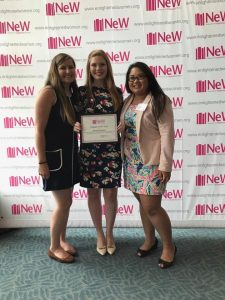Campus Program Associate Vanessa Rivera caught up with NeW at Harvard leaders Emily Hall, Kelley Babphavong, and Kate Krolicki as part of our Chapter Spotlight!

To you, what does it mean to be a conservative?
Kelley: To me, being a conservative means believing in incremental change, fiscal responsibility, and most importantly, traditional American family values.
Kate: Being a conservative means that you trust the individual to make the best decisions for themselves without government intervention. Conservatives protect fundamental liberties given to us by the Constitution through fighting for smaller government principles and more personal freedoms.
Emily: Being a conservative is believing in personal responsibility and promoting small government and individual liberties. It also requires an adherence to principle over political expediency and knowledge of the foundations of a free society.
What kind of impact has your chapter had on your campus?
Our chapter has been able to provide a space for women to examine conservative topics in a discussion-based setting, hear from top conservative speakers, and demonstrate their presence on campus through larger-scale events such as our free speech ball. We’ve also engaged women interested in politics in a more intimate setting and provide materials to educate them, like we did during a meeting we held on debunking myths about the gender-based wage gap. We’ve provided a space for conservative women to make their voices heard, and have thus strengthened our presence on campus.
Our campus impact has mostly centered around this theme of making the voices of conservative women stronger and more visible on campus. Last spring, we hosted a joint debate with the Harvard Political Union on whether the federal government should take any action in correcting the gender wage gap. Votes were counted in favor of and against the resolution at the beginning of the debate, with more people being in favor of the government taking action. By the end of the debate though, more people had switched over to the government not taking any action — it was clear that our members voices had changed some minds within an hour!
Additionally, we hosted our second annual “Free Speech Ball” event in the busiest part of campus, encouraging members of the community to celebrate free speech and write whatever they’d like on the ball. Throughout this event, we were able to engage multiple passersby in conversations about what free speech and conservatism mean to us.
Finally, we’ve been able to bring prominent conservatives to our meetings to discuss conservatism with our members and others in the campus community. Just this fall, we hosted a range of speakers including Prof. Diana Schaub of Loyola University for a discussion of the role of the family in American society, Mark Strand of the Congressional Institute for a guide to careers in conservative politics, and Mary Katharine Ham and Guy Benson for a discussion of free speech and political correctness.
What book is your chapter reading this semester? Why did you choose it?
Our chapter decided to read articles this semester, so that we could cover a range of topics. We read various articles from historical political theorists such as Thomas Hobbes and Alexis de Tocqueville to modern discussions of the gender based wage gap. We correlated the topics of the articles with specific speakers or discussions so our members could deepen their understanding of a specific topic. This allowed for our members to always have time to complete the readings and understand each speaker and discussion in a way they could then promote in their own circles.
What advice would you give someone who wants to start a chapter?
Kate: Start talking with other conservative groups on campus! They will know your target audience and will be willing to start doing joint events with you. Talking with conservatives on your specific campus will give you insight on how to best run your new chapter and give you partnerships that will last throughout the school year.
Emily: Do it! NeW is such a supportive community both on and off of my campus. The best way to start a chapter of NeW is to find a few other conservative women who care about making an impact and then talk with existing chapter leaders at other schools. I’ve gotten a lot of wonderful ideas and advice from women who’ve started chapters on their campuses, and I always love to help future chapter leaders too. Once you’ve decided to start a chapter, think about the best model for your campus–are people more likely to come for speakers? Skill building? Community? Debates? Hone in on what your members want and take their ideas into account.
What does NeW mean to you?
Kate: NeW gives me a place to call home amongst similarly minded young women. On a college campus, where most women hold very different political views than me, it is important to seek out other women who have the same values. NeW not only gives you the opportunity to do that on your own college campus, but also across the entire country.
Emily: NeW is an organization that empowers young women to think for ourselves rather than simply go along with the liberal orthodoxy that permeates our campuses and modern feminism. It has allowed me to learn, lead, write, and speak in a supportive environment that promotes conservatism and empowerment for the future of the movement, and I am honored to be a member.
